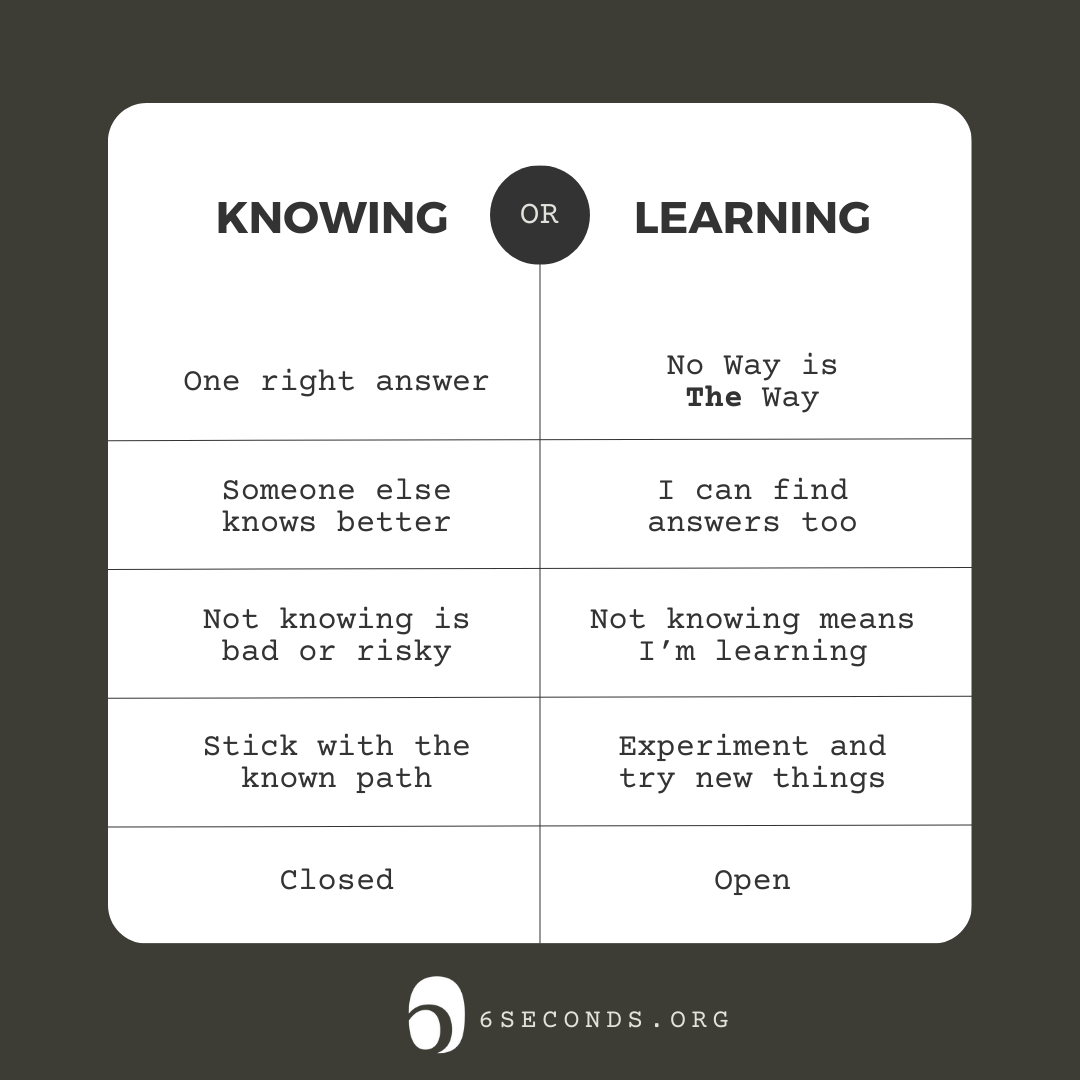Knowing Isn’t Coaching: Three Emotional Intelligence Tools for Professional Coaches 🌱
One of the principles in the Six Seconds Learning Philosophy is, No Way is The Way. It’s about being present in the moment and adapting rather than becoming too focused on the procedure. In some ways it is liberating and empowering to step into No Way is The Way – but it’s also deeply challenging because it’s not ‘normal.’
This ‘no way’ approach defies convention. The conventional way is that people should follow a prescribed path (a convention): “Learn the ‘proper’ process. Follow the script and then, once you’ve mastered it, you can adapt it to become your own.” While there’s some benefits of this approach (including a kind of comfort of following expectations), it implies that there is a ‘right’ way that basically works for everyone. This is anxiety-producing & blocks authenticity – and ignores cultural and personal differences – and reinforces an external locus of control.
In coaching, this conventional, script-oriented approach, teaches new coaches to focus on an external map rather than growing insight from the inside. If there is a “right way” then a good coach will know and obey the scripted steps; in some ways it feels safe to have this process, and it requires ‘fitting in’ and being constrained. The script was created by someone, and so it’s outside of the coach. This external focus pushes for compliance which reduces curiosity.
On the other hand, if we step into No Way is The Way, we confront the complexity of not having a clear answer. That’s hard, and also anxiety-producing. Yet it’s liberating. Now instead of finding the answers outside, we’re forced to listen to ourselves. It’s akin to the parable of “teaching people to fish”: When coaches learn to hear their own inner wisdom, they can coach for a lifetime. That inside-out approach is at the heart of the Emotional Intelligence Coach Certification.

This article is from the 🌱 Emotional Intelligence Coach Newsletter
Click here & choose the newsletters that will help you practice and grow emotional intelligence
How to Step Into Your Inner Wisdom as a Coach
To strengthen your insight as a coach, try these three emotional intelligence strategies.

Get the data: What pushes you toward Knowing?
Think about a situation where you thought it was important to know the answers. For example, maybe you’re in a meeting, and a boss asks a question, then is harshly critical of a “stupid answer.” Naturally, you might think, “I better know the answer if he asks me.”
What are some feelings that are pushing you in this situation? In this example, it might be fear of being the next person eviscerated by the bad boss… or pride in wanting to show off your knowledge… or what else?
There’s an element of comfort or safety or status in being the person with the answers. So, there’s some risk in not knowing. This threat pushes us to form protective patterns.
What’s a pattern you have around not knowing? For example, “If I don’t know the answer, I think I’m not good enough,” and, “If I think I’m not good enough, I work harder.”
To find your pattern, observe yourself as you think about that past situation, and notice yourself in other situations where you don’t have the answers. When you feel some of that sense of threat-of-not-knowing, how do you typically react?

Rethink the Emotion: How can ignorance be your ally?
Once you’ve recognized the pattern from step 1, you can Apply Consequential Thinking and consider the costs and benefits. Every pattern has both costs (downsides) and benefits (upsides). Sometimes these costs or benefits are very short-term or even illusory, but they motivate us. In the example of, “If I don’t know the answer, I think I’m not good enough and work harder,” a benefit might be: It makes me listen and learn.
A cost might be: I reduce my trust in myself.
This pattern is rooted in an external focus that’s, sadly, the basis of most classrooms: “The way is known by someone else, and my value is based on being able to tell them what they want to hear.”
If, on the other hand, we really embrace “No Way is The Way,” there isn’t an answer (or, there are many different answers). So that deficit-oriented approach doesn’t really work. If you apply this principle, what’s a different way of responding to not knowing? For example, instead of: “If I don’t know the answer, I think I’m not good enough and work harder,” perhaps:
“If I don’t know the answer, I think there’s an opportunity to learn and I feel more curious.”

Let Emotions Become Guides: What if every feeling is asking an important question?
One of the foundations of my work is the ‘radical’ notion that all emotions have value. Emotional intelligence is how we get that value (I explain this adaptive approach in Integrated Emotions or for more scholarship, check out the Adaptive Theory of Emotions – and, for a fun look at this, check out the trailer for the film Inside Out 2).
To explore this notion, let’s go back to your feelings around needing to know. As mentioned in the first strategy, it’s likely that when “needing to know,” you’re perceiving some form of threat from not-knowing… which means you’re likely to have feelings related to fear such as anxiety, worry, doubt, concern, insecure, vulnerable… for more ideas, get my big list of emotion words here – there’s a whole category of words related to “Possible Threat toward something we care about”).
Now, shift the emotion into a guide: If this feeling is asking you an important question in order to help you be a better coach… what’s it asking?
For example, it might be asking:
- How connected are you to emotions?
- How closely are you paying attention to what’s truly important for your client?
- What’s essential for your coaching right now?
What else? Please help build our collective insight by sharing in the comments below!
If you try these tips yourself, or in coaching, please come back and drop a comment to share your advice with all of us.
And, if you have questions you’d like me to explore in a future 🌱 EQ Coaching newsletter and/or video, please post in the comments, or feel free to reach out to me via our contact form.
… and don’t forget to Click here to subscribe to the EQ Coach Newsletter.
Whether you’re a professional coach, or contemplating earning certification as a professional emotional intelligence coach*, or you’re someone who uses coaching techniques to support others: of course these questions apply to us first.
* Did you know? In addition to top-level accreditation from the International Coaching Federation, the EQ Coach Certification is one of a handful of coaching certifications in North America that also provides master’s level credit? You’ll earn almost ⅓ of your MBA or MA in this program.
For more on EQ and Coaching 🌱, I recommend:
